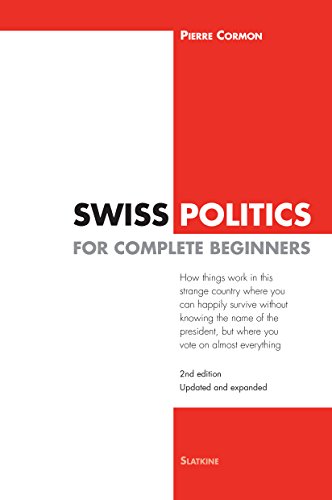

Swiss Politics for Complete Beginners

Swiss Politics for Complete Beginners
Do you want to understand why the Swiss seem to spend their time voting on every imaginable issue?
Why is the housing shortage so acute?
Why Switzerland may be the only democratic country without a majority and an opposition?
Why shops close so early?
And you don’t want it explained in a scholarly way, as you are more interested in the spirit than in the letter?
This is your book!
“A fresh look that will interest even those who thought they knew everything.”
Le Temps
“Written “for beginners”, this book will be read with interest by anyone who wants to know more about their country.”
La Tribune de Genève
“Who in this room knows the name of the Swiss President?
That’s the question I asked a group of three hundred expatriates living in Geneva area at the beginning of a “Swiss Politics for Dummies” seminar in June 2009. Around 10 to 15% of them raised their hands. About what I’d expected. And certainly not a bad score: these were people curious about Swiss Politics. Enough, at least, to sacrifice an entire evening to listen to a lecture about it. With another group, things could have been much worse.
I don’t blame them. All the puzzled looks following my seemingly simple question reminded me of a ride on the Cairo underground a few years earlier. It was the final years of Hosni Mubarak era. The portrait of the president was everywhere. His name was on the front-page of all the newspapers. On of the two biggest underground stations was named after him (the other one was named after Sadate, his predecessor).
It was January and an Egyptian friend asked me: “By the way, who’s the Swiss president?” I remained silent. I was a Swiss citizen; a journalist, writing on a regular basis about Swiss politics. I could name every member of the government, his/her ministry, his/her political party, his/her canton of origin, and part of his/her political agenda… and yet, I wasn’t sure about the name of the president. Was it… this one? Or wait… No, this one… My friend must have thought that I was completely out of touch with reality.
That may be the case, but you will see in the chapter about coalitions that there were some attenuating circumstances surrounding my ignorance.
And I’m in good company. As he was giving a press conference in Geneva in 1996, the French president, Jacques Chirac, was asked by a journalist what he thought of Flavio Cotti’s action in Bosnia. President Chirac, puzzled, asked an assistant: “Who is this Mr. Cotti?”
This mysterious person was none other than the Minister of Foreign affairs and former president of the country Mr. Chirac was visiting, and the two were supposed to meet later in the day.
Another French president, Valery Giscard d’Estaing, one sent greetings to “The president of the Swiss Confederation, Mr. Nelio Cellio.” Mr. Cellio had completed his term as president more than two years earlier and had retired from politics.”
